Writer: Could you please provide a brief overview of the Maldives Economic Position at the time this government took office?
Mr. President: At the time this Government took office, Maldives was facing an economic downturn. GDP was only growing at a slow rate of 2.2%. The major reason for this was that Maldivian rufiyaa had depreciated signiicantly due to unsustainable monetary policies implemented by the preceding government which hit hard on sectors such as the construction sector and SMEs.
Furthermore, the SOEs were not functioning efficiently, with majority of the organizations contributing to the sovereign debt burden of USD 7.8 billion accumulated by the previous government.
Writer: Are you saying that this government’s Fitch rating has nothing to do with it?
Mr. President: The recent Fitch rating reflects the pressures on external and fiscal sectors. While the Government is committed to mitigate these risks, we want to reiterate that the Maldivian economy has been growing steadily. Our usable reserves have increased to USD 443 million at the end of August 2024.
In the second quarter of 2024, we observed growth not only in the tourism sector but also in the real estate and financial services. Inflation remains low at 1.4% and with introduction of new services like International Bunkering services, we anticipate significant expansion in the wholesale and retail trade sector as well.
To bolster our dollar reserves, the Central Bank has announced new policies aimed at increasing dollar availability in the domestic market. We believe this contribution would further stimulate the economic growth.
Writer: How is the Maldives diversifying its economy beyond tourism to ensure long-term stability and growth?
Mr. President: Since last year, we’ve been actively reforming the Maldives’ financial sector with the dual goals of diversifying our economy and strengthening our financial infrastructure. Recognizing that our economy has traditionally relied heavily on tourism, we are now expanding our focus to include the inancial, maritime, and creative economies.
A major step in this direction is the establishment of our first Development Bank, which was recently licensed by the Maldives Monetary Authority. We anticipate around half a billion dollars in investment aimed at key sectors such as tourism real estate, which contributes about 28% to our GDP, as well as infrastructure development for better connectivity between our islands and renewable energy initiatives to reduce our dependence on imported diesel.
Additionally, we’re excited about the launch of the Maldives International Financial Centre in early 2025. This will be our first financial free zone, providing a range of incentives for businesses, such as tax holidays and customs duty exemptions. Our goal is to attract a diverse array of industries, promoting economic growth beyond tourism.
Moreover, we’re fostering international partnerships, particularly with global financial institutions, to position the Maldives as a competitive player in the financial services industry. By promoting strategic alliances, we aim to drive innovation and ensure long-term economic sustainability.
Through these initiatives, we are committed to creating a more resilient and diversiied economy for the Maldives.
Writer: What strategies are in place to attract foreign investments in key sectors apart from tourism?
Mr. President: The government is working on three key fronts to attract FDI into the country.
Firstly, the government recognizes the importance of a transparent, simple and secure legal framework to attract and retain FDI into the country, especially in areas apart from tourism. A new Foreign Investment Law was recently ratified which has replaced the 45-year-old existing law.
The new law outlines clear positions on open and closed areas for foreign investment, gives legal protection for investments made in the country, and paves the way to give effect to bi-lateral and multi-lateral investment treaties.
Secondly, incentive regimes are in place; especially focusing on those non-traditional or new industries. Noteworthy is the Special Economic Zones Law enacted in 2014 which has been reactivated by this government. The SEZ law outlines a comprehensive framework for granting tax as well as non-tax incentives in those areas that the Government identifies as strategic priorities through a Presidential Decree. New areas identified by the Government include strategic infrastructure development, renewable energy, export processing, projects
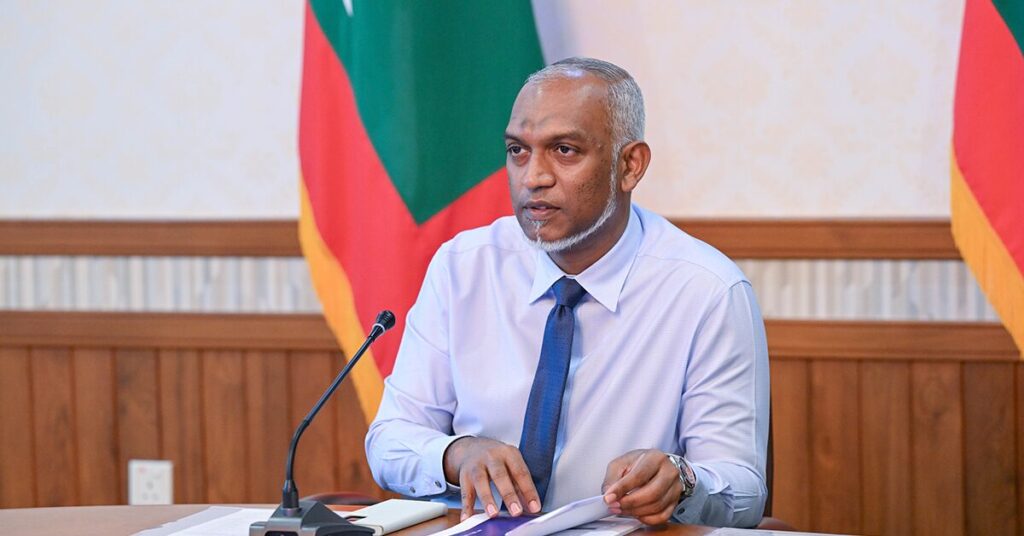
Photo: The President’s Office
focused on enhancing food security as well as international financial services.
Thirdly, the Government recognizes that at least initially, to attract private investment into non- traditional sectors, the Government needs to play a facilitating role, especially in new diversification initiatives to give the confidence and trust to private investors. In this respect, the Government has plans to invest in the basic infrastructure development and strengthening of the regulatory framework for newly identified diversification initiatives such as international bunkering, maritime services and international financial services.
Initiatives underway in this respect include the establishment of the Maldives International Financial Services Authority with a mandate to deliver a regionally competitive framework to govern international financial services as well as concrete plans to roll out specific laws on international bunkering and ratification of necessary international conventions related to international bunkering.
Writer: How is the government collaborating with international partners to promote the Maldives as a top tourism destination and attract more visitors?
Mr. President: The Maldives is actively engaging in strategic partnerships to elevate our position as a premier tourism destination. One of our key initiatives includes collaborating with international partners to enhance our global reach. For example, we have partnered with WeChat to strengthen our presence in the Chinese market, making it easier for Chinese tourists to pay with Weixin Pay, which many local businesses are now adopting.
We’ve also teamed up with online travel agencies like Fliggy and major airlines such as Qatar Airways and Emirates to improve connectivity and visibility. In addition, we are focusing on traditional markets like Italy, inviting influencers to promote the Maldives’ offerings.
Our marketing efforts include targeted digital campaigns in countries like Japan, Russia, and India, with notable successes such as a collaboration with GlobalSpa.
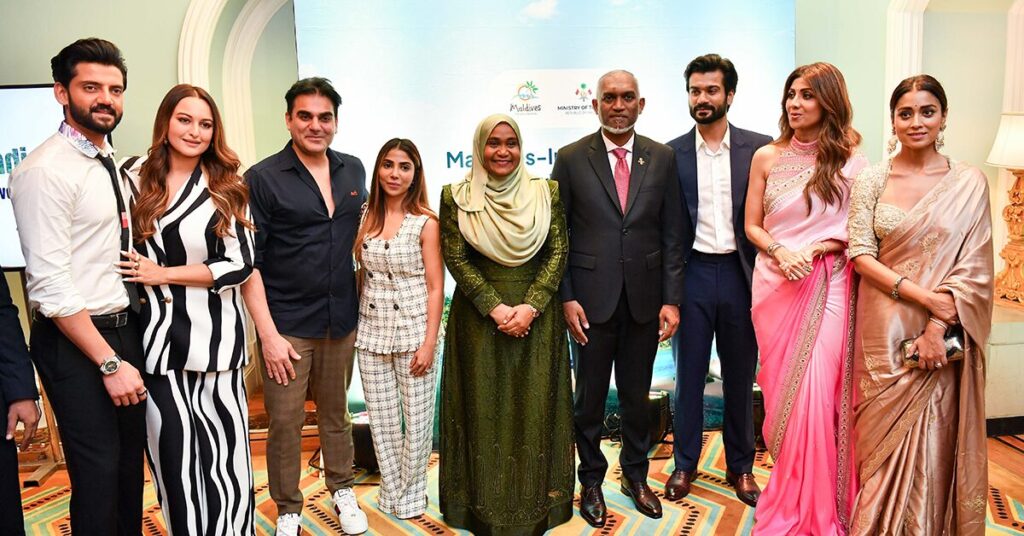
President attends Maldives-India Tourism Networking Evening
Through international participation we’ve already significantly boosted our appeal. As a result, we’ve celebrated milestones like welcoming our 1 millionth tourist ahead of schedule and winning awards, including the Indian Ocean’s Leading Green Destination.
Looking ahead, we plan to strengthen our marketing with more digital campaigns and collaborations with influencers to further establish the Maldives as an ideal global tourism destination.
Writer: At the beginning of this regime, the Indian tourist market has fallen significantly. Do you see that the market has been growing and what was the reason for that sudden drop?
Mr. President: The Indian tourist market has experienced fluctuations post-COVID but remains a crucial market for us. The initial drop was largely due to the pandemic’s impact on travel and connectivity.
We are actively working to restore air connectivity with major Indian cities, which is a top priority for us. Our focused efforts include organizing roadshows and promotional events across India to strengthen relationships with travel operators and investors.
Additionally, we have introduced seamless digital payment systems like RuPay to enhance convenience for Indian travelers. Moving forward, we are optimistic about sustained growth and deeper tourism ties with India, and we are committed to welcoming even more Indian visitors to the Maldives.
Writer: Since Maldives introduced Island guest house tourism, it became one of the most popular among the tourists and it also benefits local communities. What steps are being taken to ensure its development?
Mr. President: Community-based tourism has indeed flourished, bringing significant economic benefits to local communities. We are committed to ensuring its sustainable development through several key initiatives.
Firstly, the Decentralization Act empowers island and atoll councils to develop Land Use Plans with input from local communities. This ensures that development aligns with environmental and cultural preservation while maintaining local values.
Additionally, the Ministry of Tourism provides technical assistance to these councils and collaborates with the Maldives Marketing and Public Relations Corporation on national marketing campaigns to promote island guest house tourism effectively.
Through these efforts, we aim to continue the growth of island guest house tourism while preserving the unique character of our communities and environment.
Writer: At the beginning of the local tourism during the first democratically elected government, we have seen some scholars and the public gathered in Male’ to raise concern on its social impact. What measures has this government taken to minimize negative social impacts?
Mr. President: We recognize the concerns raised about the social impact of tourism, and we have implemented several measures to address these issues effectively.
Under the Decentralization Act, island and atoll councils play a crucial role in developing culturally sensitive tourism practices. By involving the community in tourism planning, we ensure that cultural heritage is preserved, and that social disruption is minimized.
We encourage guesthouses to offer diversified experiences and cultural activities that celebrate the Maldives’ unique heritage. This not only enhances the visitor experience but also fosters a deeper connection between tourists and local culture.
The Ministry of Tourism is actively working with local councils and stakeholders across all atolls to assess the current state of local tourism.
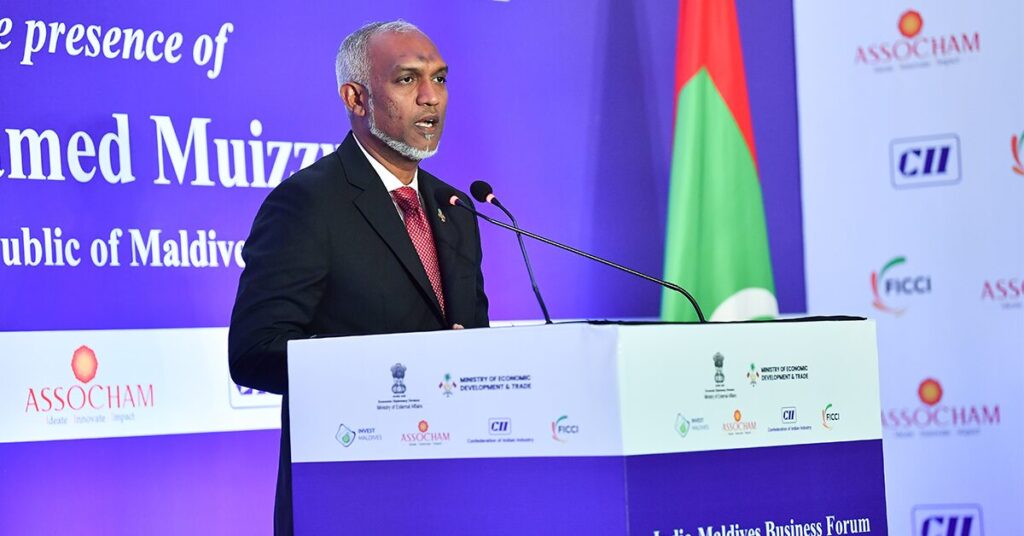
President highlights Maldives’ potential for tourism ventures at India-Maldives Business Forum
Writer: Recently you have met with Google officials in US, what role does technology play in enhancing the tourism experience in the Maldives and driving economic growth?
Mr. President: By leveraging technology, we enhance visitor experiences while promoting sustainable economic growth.
For instance, the introduction of modern digital payment systems like mobile pay, RuPay, and UnionPay streamline transactions for international visitors, making their experience more convenient. Smart tourism technologies, such as virtual tours and interactive maps, help travellers explore our offerings before arrival, increasing their conidence in choosing the Maldives.
The private sector is also innovating with sustainable practices, including solar energy and waste-to-energy systems, along with initiatives like rainwater harvesting and zero-waste operations by resorts to minimize environmental impact. Many resorts pursue ecolabels like EarthCheck, showcasing their commitment to high environmental standards and community engagement.
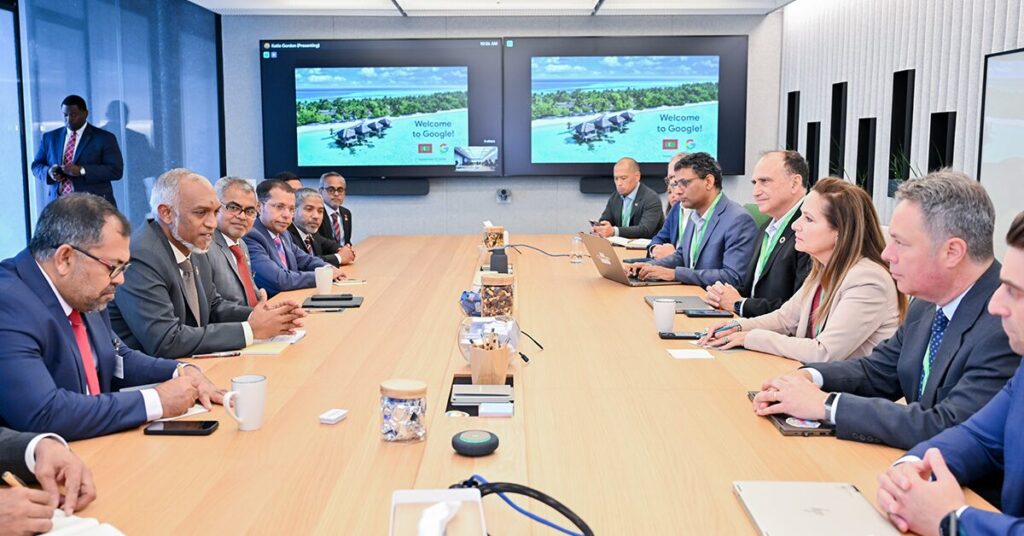
The President visits Google Office in New York
Writer: What measures is the government taking to promote sustainable tourism in the Maldives?
Mr. President: The Maldives has adopted a sustainable tourism model that balances economic growth with environmental and social responsibilities.
We take a comprehensive approach to sustainability, focusing on island selection and development that considers local employment and the use of renewable energy. Resorts must maintain the natural state of their islands, with strict regulations on vegetation removal and ecosystem disruption.
We enforce coral reef and beach protection through coastal management regulations and limit built-up areas on islands to 50% of total land, preserving significant portions for nature. Environmental Impact Assessments are mandatory for all developments to ensure minimal environmental impact.
Additionally, resorts are required to implement energy-efficient infrastructure, renewable energy sources like solar power, and comprehensive waste management systems. We also enforce policies to reduce single-use plastics in tourist establishments.
High-quality service standards are maintained through a regulated staff-to-guest ratio of 1.5, ensuring exceptional service. The Ministry of Tourism oversees compliance with these sustainability goals through regular inspections and progress reports.
Finally, we are committed to becoming carbon-neutral by 2030, with initiatives like community-led recycling programs and a robust ecotourism framework in collaboration with the Ministry of Climate Change and USAID. Through these measures, we aim to protect our environment while promoting sustainable tourism.
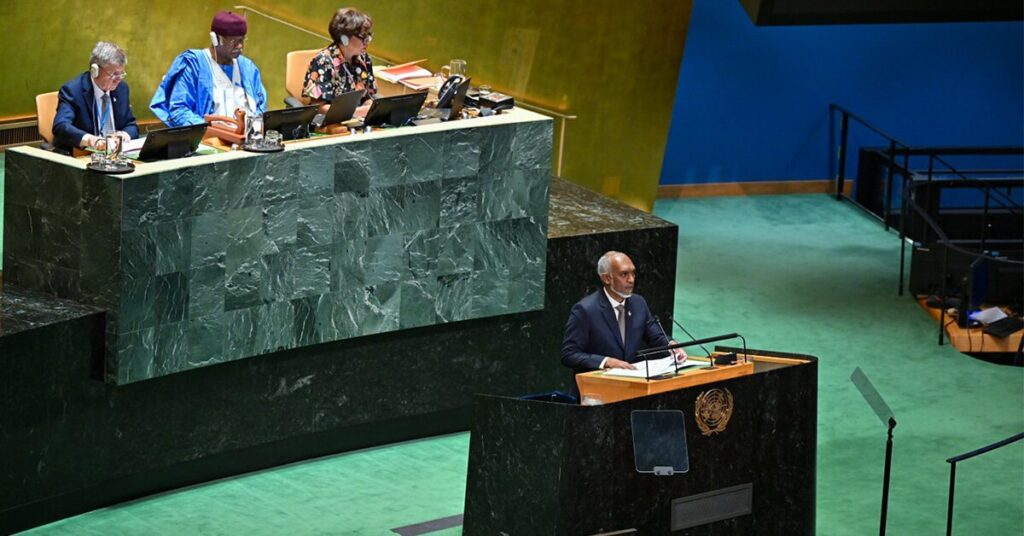
The President envisions a Maldives where digital innovation empowers young people, and drives economic opportunity and social equity
Writer: At the beginning of this interview, you have highlighted economic situation of the Maldives when this government came into power. What would be the scenario at the end of this presidential term?
Mr. President: By the end of this presidential term in 2028, our goal is to establish a robust and sustainable economy. We are committed to diversifying our economic sectors, and significant steps have already been taken, including the establishment of the first Development Bank of Maldives, which will attract foreign investment across various sectors.
We anticipate strong growth in tourism, supported by the expansion of Velana International Airport and the development of new resorts, solidifying the Maldives as a leading luxury destination.
Additionally, we aim to empower the creative sector through the Maldives Creative Economic Strategic Action Plan 2024–2028, including a fund to support women entrepreneurs.
We are also focusing on developing a digital economy, targeting a contribution of 15% to GDP by 2030, leveraging our high internet penetration and social media engagement.
By the end of this presidential term, our goal is for our policies to enhance economic resilience to external shocks and position the Maldives as a model for sustainable development among small island nations, with the vision of becoming a developed country by 2040.
Editor’s Note
In this exclusive interview, President Dr. Muizzu provides a comprehensive overview of the Maldives’ economic transformation and future vision. Against the backdrop of current economic challenges, including a USD 7.8 billion sovereign debt and recent Fitch rating pressures, the President outlines ambitious plans for diversifying beyond the nation’s traditional tourism base.
The interview is particularly timely as the Maldives prepares to launch its first International Financial Centre in early 2025 and implements new policies to strengthen dollar reserves. Dr. Muizzu discusses how his administration is addressing immediate economic concerns while laying groundwork for long-term stability through initiatives in financial services, maritime trade, and digital innovation.
Of special interest are the President’s insights on sustainable tourism development and the nation’s evolving relationship with key markets. The discussion reveals how the Maldives is balancing its reputation as a luxury tourism destination with environmental preservation and local community development.
As the Maldives charts its course toward becoming a developed nation by 2040, this interview offers valuable perspective on the challenges and opportunities facing this Indian Ocean archipelago. The President’s responses provide a detailed roadmap of how his administration plans to transform the Maldivian economy while maintaining its unique natural and cultural heritage.
Published: November 10, 2024



